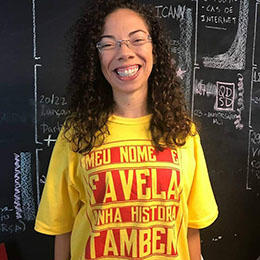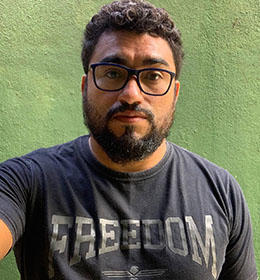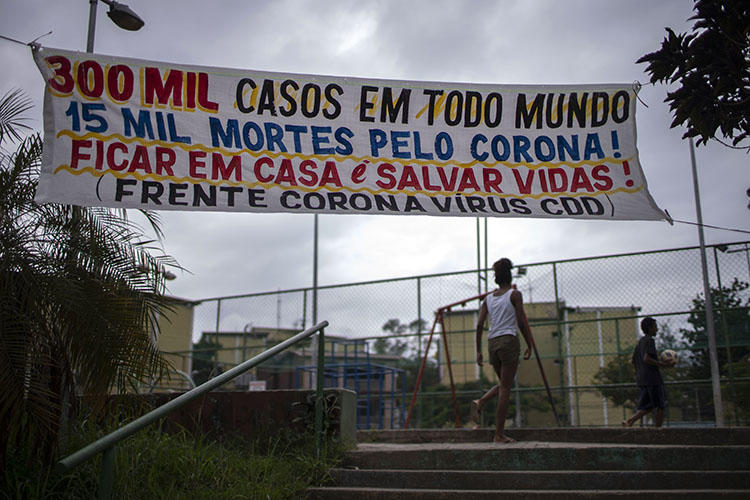Before the COVID-19 pandemic hit, Gizele Martins and Raull Santiago—community journalists from Rio de Janeiro’s favelas—worked to bring accurate news and information to the local population and to give visibility to their struggles. Their organizations are among dozens of media groups founded by residents of Rio’s favelas and other marginalized areas aiming to challenge stereotypes, reduce stigma, empower residents, and build a diverse narrative about their communities.
Brazil’s first case of COVID-19 was confirmed in late February, and since then, more than 101,000 cases have been reported and at least 7,000 people have died, according to May 3 data from the Brazilian Health Ministry. Rio de Janeiro’s densely populated favelas account for around 22% of the city’s 6.7 million people, according to the last national census. When the first case of COVID-19 was confirmed in Rio, favela residents began to worry about the impact of the pandemic in these areas, where many households do not have regular access to water.
As of May 3, there were just 55 confirmed coronavirus deaths in the favelas, according to a special online monitoring panel set up by community media group Voz das Comunidades, which systematizes information from Rio’s city and state governments and is updated daily. The numbers, however, are believed to be much higher due to a lack of testing in the favelas and the fact that some of the cases are counted together with the numbers of the larger neighborhoods in which they are located.
CPJ spoke with Martins, from the Complexo da Maré, and Santiago, from the Complexo do Alemão, about their experiences working in the favelas during the pandemic, including logistical challenges in getting information about COVID-19 to the population and battling false news and disinformation–some of which is spread by the country’s highest authorities. Their answers have been edited for length and clarity.
Gizele Martins, community journalist, Maré 0800 group, Maré Complex of favelas
Gizele Martins, 34, is a community journalist from the Maré Complex of favelas, where she was born and raised. She has been a community journalist for almost 20 years, beginning work as a teenager with community media outlet O Cidadão. In 2014, she founded Maré Vive, a community media group aiming to report on the occupation of Maré by the army as part of the city’s preparation for the upcoming World Cup. In 2011, Martins received her journalism degree from PUC-Rio University.

What activities are community media groups implementing in Maré during the COVID-19 pandemic?
Around mid-March community media groups like Maré Vive, Maré 0800, O Cidadão, and others gathered in Frente de Mobilização da Maré (Maré Mobilization Front). We are all working together, and this is something historic. It is very good to see all the community media working together, although too bad it is in such a sad moment of the coronavirus outbreak. Now, in the Front, we have members of the community media groups, members of artistic groups, and around 50 residents.
We made a communications plan six weeks ago to target an audience that is actually ourselves, the favela residents. We know that, in the favelas, not everyone has internet access, not everyone has electricity, not everyone can read, nor has access to the health system app for the coronavirus.
So, we have rented a sound car to circulate with audio messages, with the guidance of professional health workers from Maré, explaining what coronavirus is, what the symptoms are, where the hospitals treating it are located, and highlighting the relevance of respecting social distancing. We have also hung banners and posters and thought of other tools such as street art, graffiti, videos, and photocards to disseminate and use in the media. We have also included information about domestic violence in our materials.
Besides communication, we are also registering vulnerable families so they can receive donations of basic goods and hygiene material we collected.
What is the importance of community media in general and, in particular, amid the COVID-19 pandemic?
The work has been hard and challenging. Maré is huge, so we are unable to put banners in all the streets, the sound car cannot circulate through all the streets. We need to think of better ways to reach out to the highest number of people at all times, or all 140,000 residents will not be reached. Despite this being hard work, there have been results. If it weren’t for community media, for the popular movements, for the community journalists, we would not have achieved the result of so many people staying at home. And we will continue this campaign because we have seen how necessary it is. It speaks the language of the locals, and it is inside the community.
Community media dialogues directly with its audience and [these outlets] are important because they show local reality from within but also claim people’s rights. And that’s what Maré Vive, O Cidadão, Maré 0800, have been doing all these years in Maré. We write about the protagonism of the favelas, their culture, the profile of the residents. We denounce police brutality and state violence. But we also claim people’s rights, their right to life, and their right to communication.
How has the pandemic affected your work and the work of community media in Maré?
It’s been hard work as everything needs to be done through the internet: all the meetings, the decisions, registering families. All the organization and mobilization needs to be done from inside our own homes. It takes longer to do things like this because we cannot be in the streets taking action. A lot of things in the favelas are done face to face, and paid in cash, not with a bank card. And now we cannot simply go outside to get all this done. It has to be done online, by email, via messaging apps… In the first days I already felt the difference of being a community journalist having to work locked up at home, unable to be in the streets.
What are the greatest challenges you face in your work amid the COVID-19 pandemic?
Some of the challenges are related to internet access and access to other services. In my home, for example, I cannot use my mobile to make a call or text someone as the mobile line does not work here. There is a member of the group who does not have a computer at home, another one does not have money to put credits in his cellphone. This is the reality of many of the members of community media groups–unstable internet access, malfunctioning devices.
There is the challenge of not being able to be out in the streets talking to people. We have a group of people, who are not within the so-called “risk group,” that at some point goes out to hang the banners and then go back home. But we do not distribute pamphlets, we cannot stop to talk to people, chat, and clarify “face to face” any doubts they might have. And this is probably the biggest obstacle during this moment. We cannot be in the streets, and community communication is made of being in the streets. This is a challenge we felt during the very first days.
Those of us who have to go out are wearing masks and we have been asking for donations of other protective equipment, alcohol, water, and soap, to protect them.
There is also the risk of being connected 24 hours, on the internet, on messaging apps, on the TV, hearing everything about coronavirus, rethinking our campaign, and answering messages all the time. I myself have not been able to disconnect yet.
How are you and community media in Maré dealing with the circulation of false news about COVID-19?
Besides all the challenges, we have the spread of false news and the irresponsible statements of political authorities. In the first two weeks we managed to have more people stay at home in Maré. But when there was a statement by the president [Brazilian President Jair Bolsonaro] saying that people could go back to their normal lives, then we saw an increase in the number of people circulating in the streets.
So, in addition to all the information we produce and the communication we do about COVID-19 and its consequences, we also have to stay tuned to hear the false news spreading and the irresponsible statements from authorities in order to, at all times, produce “counter-information.”
———————————————————————————————-
Raull Santiago, community journalist, Coletivo Papo Reto group, Alemão Complex of favelas
Raull Santiago, 31, is a community journalist from the Alemão Complex of favelas, where he was born and raised. He is one of the founders of Coletivo Papo Reto, an independent community communication group working on human rights, culture, education, justice and memory in Alemão. Papo Reto is a result of a mobilization that started in late 2013 and early 2014 after heavy rains resulted in houses collapsing in Alemão, leaving many people homeless.

What activities are community media groups implementing in Alemão during the COVID-19 pandemic?
With the global COVID-19 pandemic, Papo Reto united with the community news outlet Voz das Comunidades (Communities’ Voices) and the group Mulheres em Ação (Women in Action) and formed a “Crisis Cabinet” in Alemão. The Crisis Cabinet has two objectives. One, to build a robust and detailed communication that dialogues with the reality of the favelas and that explains to residents the importance of coronavirus. Another, targeting an audience external to the favelas, asking for donations of food supplies, water, hygiene, and cleaning materials. People are already in need of those basic items in order to avoid the spread of the virus in the favela and we are now distributing them to residents.
We realized we needed a communication strategy that could dialogue with the local reality of the favela, understanding that not everyone has a TV or access to the internet. Our communication needed to talk to each one from the different realities. The elderly, the youth, children, mototaxi drivers, illiterate people, and all the other different groups within the space of the favela.
Our first action was to have a sound car circulating in the favela with important recommendations about how to avoid infection and proliferation of coronavirus and basic care measures recommended by WHO [World Health Organization]. We wrote those same messages and recommendations in banners that we then hung in the main accesses to Alemão. We also hung posters in strategic places in the favela, like small markets and bus stops.
We made sure that some of the messages publicized highlighted local inequalities, such as the lack of access to water in many households. We urged residents that have access to water to share their water with those who do not, as an act of solidarity and as a collective effort to prevent coronavirus infection.
One of the main WHO recommendations is for people to wash their hands as frequently as possible. But, unfortunately, in an unequal society, the water supply is not adequate in the favelas. There is more lack of water than access to water. Therefore, we need strategies to ensure people’s access to water.
All our efforts now are focusing on the favelas in Alemão as it is a huge area. But we have been able to support groups in other areas as well. We have supported the residents’ association in a neighboring group of favelas, Complexo da Penha, with their organization. And we have also made donations to a hospital in the favela of Acari and a basic health unit in Alemão.
What is the importance of community media in general and, in particular, amid the COVID-19 pandemic?
Community media in a favela is important to dispute the narrative about the favela. For too many years there was a voice from outside creating the image of the favela within society. The press who covered the favelas did it from the outside. Many of those working in the press and narrating the reality of the favelas were not from the favelas and marginalized areas. A community media group from inside the favela is here to build a different narrative that does not approach only violence, but also all the power within the favelas. We live in a reality where our basic rights are denied to us, but we, nonetheless, manage to build so many powerful things.
During this coronavirus pandemic it is crucial that we, who live and work here, communicate with the favelas and outside the favelas as it will penetrate more and have a broader and more impactful outreach.
How has the pandemic affected your work and the work of community media in Alemão?
The COVID-19 pandemic changed my routine completely. My regular work activities downtown were cancelled. And Papo Reto activities were put on hold for the moment so we could concentrate efforts to respond to the crisis.
The new activities are generating a situation of extreme exhaustion, physical and psychological stress, distancing from family. Everything I was doing before the crisis has stopped or been drastically reduced. But, on the other hand, the new frontline is consuming, demands a lot of presence and caution. We monitor closely the protection equipment of our group members, we have strict hygiene procedures to avoid getting infected and infecting our families while we do our job.
I’m impacted by how much my circulation was reduced. As an activist, a community journalist, I circulated a lot and traveled a lot. Now, I haven’t left Alemão and its surrounding for a long time.
What are the greatest challenges you face in your work amid the COVID-19 pandemic?
The biggest challenge we face in the “Crisis Cabinet” is to convince people to make social distancing a reality in their lives. There are still a lot of people in the streets, a huge flow of people and agglomeration spots. It is reducing, but very slowly. This is serious and difficult, especially since local and national leaders are making criminal speeches contrary to the WHO recommendations. President Jair Bolsonaro himself treats this pandemic, that has already taken so many lives throughout the world, as a minor thing, mocking it. He is encouraging people not to practice social distancing and spreads false news, which for many people becomes then something true since it is a figure with the status of president saying such absurd things.
The biggest challenges are to tackle false news and to come up with daily strategies to make people understand the seriousness of what is happening in the country.
How are you and community media in Alemão dealing with the circulation of false news about COVID-19?
Some of us are monitoring WhatsApp groups and what we hear during our activities to immediately respond to a false news that is spreading and build a counterpoint.
The medical staff and community health workers are supporting us in our public communication. And we are working closely with them to monitor cases, meeting them weekly to monitor cases, to find out what has gotten worse, what are the basic data about what’s happening in the favela. And that has been an important step for us–to identify what worked and what needs to be changed in our strategies to communicate daily to avoid the spread of the virus in here.
CPJ’s safety advisory for journalists covering the coronavirus outbreak is available in English, Portuguese, and more than 35 other languages. Additional CPJ coverage of the coronavirus can be found here.
